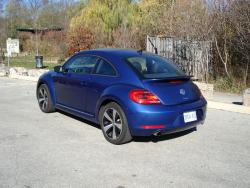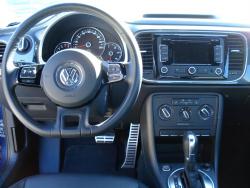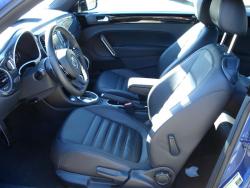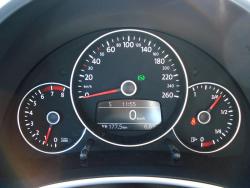 2012 Volkswagen Beetle Sportline. Click image to enlarge |
|
First Drive: 2012 Volkswagen Beetle
Manufacturer’s web site |
Review and photos by Mike Schlee
Photo Gallery:
2013 Volkswagen Beetle Turbo
When Volkswagen released the New Beetle in 1997, the rear-engine air-cooled crowd had a conniption fit. They demanded answers: how could Volkswagen decimate their legendary punch buggy with this front-wheel drive cutesy abomination? Well, vehicle sales of course. If you have an iconic vehicle name and shape that anyone from a toddler to a senior can instantly recognize, why not try to bank on it?
Needless to say, the New Beetle was a success the world over and now, nearly 15 years later, Volkswagen is making a new New Beetle; one that looks more like the old Beetle than the old ‘New Beetle’ but without the word ‘new’ in front of this newest Beetle. Confused yet?
The restyled 2012 Beetle is now assembled at Volkswagen’s plant in Puebla, Mexico alongside the current Jetta. As you may know, the Volkswagen Jetta grew significantly during its latest redesign and with the Beetle sharing the same basic platform, it too has grown. This pays off in spades when it comes to rear seat and trunk space. The previous ‘New Beetle’s’ afterthought of a rear seat has been replaced by a tight, but now livable seating area even for someone of my height. The trunk is equally usable now and boasts 440 L of space under the rear hatch which expands to 850 L when the rear seats are folded down-ish; they do not go completely flat.
   2012 Volkswagen Beetle Sportline. Click image to enlarge |
The downside of being based on the new Jetta platform is an interior that has taken a step backward from previous Volkswagens. Close the driver’s door and an echoing hollow rattle emits the likes of which I haven’t heard since a 1994 Cavalier. The actual interior design ranks up there with some of the most boring in recent memory and the overuse of faux carbon fiber is doing the Beetle no favours. Although hard plastics dominate the interior, the parts that are touched regularly, like the thin-rimmed steering wheel, do feel of great quality.
Once seated in the great, comfortable front seat though, things begin to look up. The driving position is perfectly situated and sightlines all around are impressive minus a bit of blockage from the rear C pillar. There are cubby holes and storage spaces everywhere, but they’re on the small side. Being that the Beetle is formed in the airy, curvy shape of the original, the windshield took a while to get used to as it felt so far in front of me.
My tester was the top-of-the-line 2012 Beetle Sportline. This means items like 18-inch alloy wheels, alloy sport pedals, dual exhaust, fog lights, running boards in black, keyless access w/start & stop button, leather sport seats, sport suspension and of course, the 2.0 L turbocharged 4-cylinder engine, were included. Added to this trim were the Connectivity Package (Bluetooth) and Technology Package (Fender audio system and GPS navigation).
Unfortunately, my test car did not include the slick 6-speed manual transmission and came equipped with the optional automatic unit. But, if it must have an automatic transmission, at least it is a good one. The transmission I am referring to is Volkswagen’s 6-Speed dual-clutch direct-shift gearbox. Featuring two clutches and multiple shafts, this transmission is essentially a manual transmission missing a clutch pedal. Applied for years in several Volkswagen products, nothing surprised me about its operation. The transmission can still be confused in stop-and-go traffic where it hesitates in gear selection or gets caught out in the wrong gear, and it is still a blast to drive in ‘sport’ mode or ‘manual’ mode. The slow reactions and minor turbo lag found in the transmission’s regular ‘Drive’ mode meant I spent most of the time driving it in ‘Sport’ or ‘Manual’ which hurt fuel consumption, racking up an average of 10 L/100 km. Still, that is not too far off Natural Resources Canada official ratings of 9.9 L/100 km city and 6.5 L/100 km highway.











